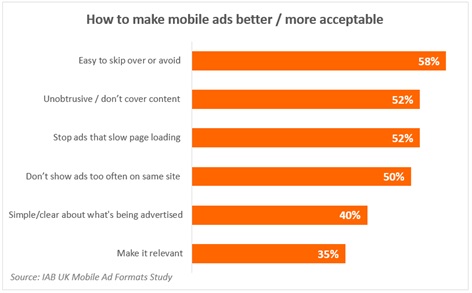Giving consumers more control and using “common sense” are the main ways to improve mobile advertising and make it more acceptable to consumers, according to a major study by the Internet Advertising Bureau UK.
Key findings:
- 10% of Brits are blocking mobile ads
- Consumers specify what they want from ads to be deemed acceptable
- Study assigns superhero “personas” to 6 ad types to help marketers choose which to use
The study, conducted by Differentology, used a mixture of online surveys, consumer diaries and in-depth interviews to understand what consumers really think about mobile ads, so marketers can produce better mobile campaigns and reduce ad blocking. It revealed 10% of people currently block mobile ads – millennials accounting for 63% of this group.
Almost for in five consumers accept that ads fund free internet content but they need to feel in control, particularly on mobile, and ad blocking is the way to gain control,” said Mike Reynolds, the IAB UK’s Mobile and Video Manager.
“Golden rules” revealed
The study reveals and summarises the key do’s and don’ts for marketers to maximise campaign success and minimise ad blocking:
Do’s = Keep ads simple, fun, short. Less frequent. Be creative. Be relevant.
Don’ts = Hijack or take-over the user experience. Omit x/skip button. Go straight to app store/other sites. Overload by frequency. Overload amount of data/ad size.
“Getting mobile ads right is a delicate balance – even consumers have mixed feelings about what they like,” noted Reynolds. “For instance, ads with higher impact can be more annoying, while relevant ads based on location or behaviour are welcomed but may raise privacy concerns. With higher impact comes higher risk but the golden rules involve common sense – don’t hijack the user experience (78% “can’t stand” ads that take over the whole screen) and don’t omit, or make it difficult to find, the ad close/skip button, which inevitably annoys people.”
Nearly six-in-10 (58%) consumers identified a clear ‘X’ button or a ‘skip ad’ function as the best way to make ads more acceptable. Over half (52%) cited making ads less obtrusive in terms of how much content they cover as a way to make ads more acceptable – the same number who cited stopping ads that slow page loading.

Which “hero” to call?
The research dug into what consumers think about the six main mobile ad formats. This enabled the IAB to assign a superhero “persona” to each format to help advertisers deploy the best ones depending on the campaign parameters:
- Standard Banner: “The Soldier” – Simple. Reliable. Well-liked. Never outstanding or exciting. Favoured by older and lighter users
- Rich Media Banner: “The Star” – Everyone’s favourite. Engaging. Creative. Choice to pass or engage fully
- Pre-Roll Video: “New Kid on the Block” – Interruptive. Engaging. Creative. Liked by Millennials
- In-Read: “Team Jester” – Interruptive. Preferred by younger audience. Very engaging, especially with short-form content (social)
- MPU: “Loyal Help” – Accepted by consumers. Not as engaging. Easy to miss
Interstitial: “Reckless Hero” – Extremely engaging. Communicative. Can be annoying. Present a clear exit
“It’s about understanding what consumers really want from mobile advertising and, consequently, knowing which format, or hero, to call on,” concludes Reynolds. “Each format has a role to play and using a mix of high impact ads alongside standard ones, such as MPUs, will ensure you grab consumer attention without annoying them. This improves the ad experience, resulting in more effective campaigns and less reasons to block ads.”
Differentology conducted an online survey of 1,012 respondents between 29th March – 8th April, supplemented by consumer diaries and in-depth interviews. Findings were weighted to be representative of the UK population.
Watch this light-hearted film video from IAB outlining how the industry can overcoming mobile ad blocking:
Ad blocking goes mobile: 615m devices blocking ads worldwide – Feb 2017

